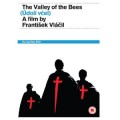| Reviews & Columns |
|
Reviews DVD TV on DVD Blu-ray 4K UHD International DVDs In Theaters Reviews by Studio Video Games Features Collector Series DVDs Easter Egg Database Interviews DVD Talk Radio Feature Articles Columns Anime Talk DVD Savant Horror DVDs The M.O.D. Squad Art House HD Talk Silent DVD
|
DVD Talk Forum |
|
|
| Resources |
|
DVD Price Search Customer Service #'s RCE Info Links |
|
Columns
|
|
|
Valley of the Bees -- Second Run UK Import, The
Second Run // Unrated // March 22, 2010
List Price: £12.99 [Buy now and save at Co]
The Film:
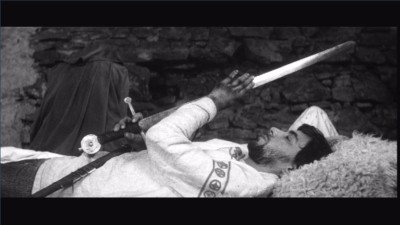 There's a ritual among athletes, especially boxers or other prizefighters, where they detach themselves from everything else in the world and concentrate solely on honing their bodies for a significant bout. Some stay around their home and gym locally, while others -- if they have the means -- might travel to a faraway place to better their focus. They eat purely, exercise extensively, and, most importantly, often abstain from sexual activity, and the results typically lead to a form of euphoria or joy about their triumph over pain. Now, imagine doing all of this somewhat against your will for a goal or purpose that you're not even certain that you believe in, a theme that persists even amid modern wartime conflicts. That becomes the central focus in Czech director Frantisek Vlacil's The Valley of the Bees (Udoli vÄel), a stunning portrait of a man sent away to train with the Teutonic Knights in 13th century Europe.
There's a ritual among athletes, especially boxers or other prizefighters, where they detach themselves from everything else in the world and concentrate solely on honing their bodies for a significant bout. Some stay around their home and gym locally, while others -- if they have the means -- might travel to a faraway place to better their focus. They eat purely, exercise extensively, and, most importantly, often abstain from sexual activity, and the results typically lead to a form of euphoria or joy about their triumph over pain. Now, imagine doing all of this somewhat against your will for a goal or purpose that you're not even certain that you believe in, a theme that persists even amid modern wartime conflicts. That becomes the central focus in Czech director Frantisek Vlacil's The Valley of the Bees (Udoli vÄel), a stunning portrait of a man sent away to train with the Teutonic Knights in 13th century Europe.
Discussing the extent of the plot's developments, however, is difficult, as very little actually happens in the film -- even less so than in VlaÄil more widely-known work, Marketa Lazarova. A young boy named Ondrej is hauled off to train with the monastic order after his father swears his life to religious service, following a violent incident at the father's wedding involving his young bride, a bowlful of flowers, several bats and a kid's tweaked idea of an innocent gesture. We move forward many years to the point where he (Petr Cepek) is now a weathered man attempting to stomach the rigid, pious ways of the Teutonic Order, all while honing his body through rigorous training and fasting. What's expected of him is a form of euphoric surrender to God's service, aided by the stalwart mentorship offered from model mason Armin (Jan Kacer), but his thwarting of the order to return home to his father's keep causes a stir.
Other events do occur, especially as illustrative sub-segments, but this "fall from grace" is the meat of the matter. It becomes very obvious within mere minutes of starting VlaÄil's film that he draws immense influence from Ingmar Bergman, especially from the likes of The Seventh Seal and Virgin Spring. His visuals are deeply profound and poetic, matched by equally dialed-in dialogue that leans more of the whimsical and existential than the practical. Early on, Ondrej floats with Armin naked in the sea nearest to their parish, where their dialogue eloquently dances around the holiness obtained through inflicting desire-equalizing pain on one's body -- emphasized by the frigid water numbing their lower bodies. Similar sequences centered in fundamentalist acts give The Valley of the Bees a thorough contemplative essence, from the process of losing everything in one's life as a way of finding God to pilgrimages for penance and fasting with only fish as nourishment.
Whether the content appeals to one's curiosity or not, it's hard not to acknowledge the precision in VlaÄil's reconstruction of the 13th Century European setting from a historical standpoint. Captured in 1968, the authenticity generated in the landscapes, interior shots, and through the knights' coats of armor is stunningly realized and could pass for modern grayscale photography. In conjunction with cinematographer Frantisek Uldrich's eye, his composition adds volumes to the film's weight as an existential piece of work -- capturing penitent statues carved into walls, rows of fish sitting before the knights at a dinner table, and a few striking images of both Ondrej and Armin clad with chainmail and cross-suggestive long swords. He also asks us to look upon gorgeous archways in courtyards and through windowsills in a way that transplants us to the time period, while also speaking to high-art with dense, earthy textures and expansive horizons with the period's buildings in their clutches.
VlaÄil's eye for the period and focus on fundamentalist imagery don't stop The Valley of the Bees from being a premeditated and demanding narrative, told with light story exposition and heavy existential contemplation. As a work of art, while just absorbing the aesthetics, it's satisfying on its own accord; however, they're dressings for an accurate and profound portrait of a man enduring a clash of faith predicated on his desire to return to his homeland -- and the rift his "human" whims causes with the Teutonic Order. Allegories are drawn between training the knights and orchestrating a pack of hungry dogs to hunt down their pray, tying in to the somewhat empty lack of reward generated by obeying the volatile orders of a higher master. In that, you'll also see a few surgically handled yet hard-to-watch images that VlaÄil constructs, such as dogs hunting down a deer. This ties back towards the vicious punishment that the Masonic order exacted on another man who desired to stray from their confines, torn to shreds by dogs in a pit following a conviction from cloaked, stern members of his order.
The Valley of the Bees engrossingly batches all this together amid its hour-and-a-half pace with its audience, proving that VlaÄil's talent with existential thought and integrity breathes with the same essence as his influences. His performers are universally spectacular, natural but carrying a dramatic disposition in their eyes and facial mannerisms, all of which showcase emotional and mental turmoil that stretch beyond what they're allowing to the surface. That's the key with this style of picture, much like Max Von Sydow's recurring temperament in Ingmar Bergman's pictures. VlaÄil concentrates deeply on making his experience genuine and entrancing for the eyes, yet it's all for the purpose of enveloping us in a realistic portrait of history so we might identify with Ondrej's fraught mindset. We're enveloped so that we might wrap our minds around a man's desperate yearning to separate from the blade-wielding service for a higher power, a duty that calls for the loyal to have nothing more, and simply return to his home. His journey, both the physical actions and the internal turmoil, fascinates.
The DVD:
Second Run have offered The Valley of the Bees in a standard, clear-cased presentation with the company's signature minimalist artwork. Inside, a Booklet contains production credits for this home video presentation, and a lengthy information piece on Frantisek Vlacil composed by Peter Hames. Please note that this DVD is region-free but encoded in the PAL format, so makes certain that your television and/or DVD player are capable of displaying this content before purchasing.
Video and Audio:
Stunning is the film, and stunning is Second Run's presentation of The Valley of the Bees.
They have clearly taken this presentation with great care, as the 2.35:1 anamorphic widescreen presentation of late-'60s Czech film elements offers an excellently balanced, detailed, and properly contrast rendering of the black and white cinematography. Many alluring images appear that give this disc some real eye candy, such as religious buildings with gut-swelling arches within its architecture and quaint keeps, houses, and patches of both marsh and dry lands that offer succulent details within every shot. It's worth noting that some aliasing does crop up along a few edges, while some moire shimmering can be spotted in rooftops and against the chainmail armor worn by the knights. However, this print is astounding pristine, with highly convincing contrast levels -- including properly dark blacks and surprisingly dimensional gray levels -- that make Second Run's disc truly impressive and rarely indicative of the film's age.
A restored Mono track accompanies the visual transfer, and it's equally as impressive. Verbal clarity remains clear and distortion/pop free, while the engrossing free-form scoring, which includes flute notes that stretch the spectrum of pitches, create a balanced and uneasy atmosphere that's easy to get lost in. Monk chanting also fills the speakers throughout, which rings true, while other light sound effects like a deer's cry, burning embers, and other ambient notes further the atmosphere eloquently. English subtitles, which remained on-beat with the dialogue, arrive in clean and easy-to-read text that, unless I'm mistaken, never trails below the actual print of the film.
Special Features:
Aside from the textual information in the Booklet, no supplements are available here aside from a Scene Selection.
Final Thoughts:
Frantisek Vlacil's The Valley of the Bees (Udoli vÄel) requires a cinematic investment that many might not be as willing to invest in as others, as it asks its audience to grasp a historical critique on a 13th Century Teutonic Knight through a deliberately streamlined narrative. Counterbalanced by gorgeous photography and terse, evocative performances from all involved, it revolves around a stirring look at one man's desire to separate from an unwilling enlistment to weapon-wielding religious service -- and how it affects both his mentor and the order with whom he serves. VlaÄil's experience might be complex, but it's beautiful and enveloping all the same. Second Run's standard-definition presentation preserves the essence of the picture with impeccable quality, offering a Czech film from 1968 in a crisp presentation that rivals most offerings of contemporary films. Highly Recommended.
Thomas Spurlin, Staff Reviewer -- DVDTalk Reviews | Personal Blog/Site
 There's a ritual among athletes, especially boxers or other prizefighters, where they detach themselves from everything else in the world and concentrate solely on honing their bodies for a significant bout. Some stay around their home and gym locally, while others -- if they have the means -- might travel to a faraway place to better their focus. They eat purely, exercise extensively, and, most importantly, often abstain from sexual activity, and the results typically lead to a form of euphoria or joy about their triumph over pain. Now, imagine doing all of this somewhat against your will for a goal or purpose that you're not even certain that you believe in, a theme that persists even amid modern wartime conflicts. That becomes the central focus in Czech director Frantisek Vlacil's The Valley of the Bees (Udoli vÄel), a stunning portrait of a man sent away to train with the Teutonic Knights in 13th century Europe.
There's a ritual among athletes, especially boxers or other prizefighters, where they detach themselves from everything else in the world and concentrate solely on honing their bodies for a significant bout. Some stay around their home and gym locally, while others -- if they have the means -- might travel to a faraway place to better their focus. They eat purely, exercise extensively, and, most importantly, often abstain from sexual activity, and the results typically lead to a form of euphoria or joy about their triumph over pain. Now, imagine doing all of this somewhat against your will for a goal or purpose that you're not even certain that you believe in, a theme that persists even amid modern wartime conflicts. That becomes the central focus in Czech director Frantisek Vlacil's The Valley of the Bees (Udoli vÄel), a stunning portrait of a man sent away to train with the Teutonic Knights in 13th century Europe. Discussing the extent of the plot's developments, however, is difficult, as very little actually happens in the film -- even less so than in VlaÄil more widely-known work, Marketa Lazarova. A young boy named Ondrej is hauled off to train with the monastic order after his father swears his life to religious service, following a violent incident at the father's wedding involving his young bride, a bowlful of flowers, several bats and a kid's tweaked idea of an innocent gesture. We move forward many years to the point where he (Petr Cepek) is now a weathered man attempting to stomach the rigid, pious ways of the Teutonic Order, all while honing his body through rigorous training and fasting. What's expected of him is a form of euphoric surrender to God's service, aided by the stalwart mentorship offered from model mason Armin (Jan Kacer), but his thwarting of the order to return home to his father's keep causes a stir.
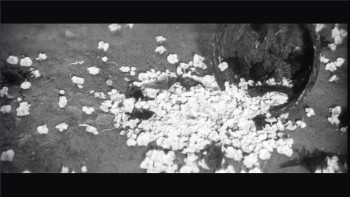 | 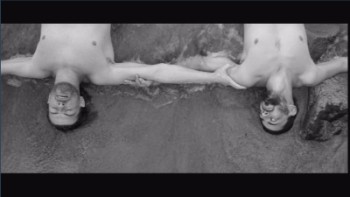 |
Other events do occur, especially as illustrative sub-segments, but this "fall from grace" is the meat of the matter. It becomes very obvious within mere minutes of starting VlaÄil's film that he draws immense influence from Ingmar Bergman, especially from the likes of The Seventh Seal and Virgin Spring. His visuals are deeply profound and poetic, matched by equally dialed-in dialogue that leans more of the whimsical and existential than the practical. Early on, Ondrej floats with Armin naked in the sea nearest to their parish, where their dialogue eloquently dances around the holiness obtained through inflicting desire-equalizing pain on one's body -- emphasized by the frigid water numbing their lower bodies. Similar sequences centered in fundamentalist acts give The Valley of the Bees a thorough contemplative essence, from the process of losing everything in one's life as a way of finding God to pilgrimages for penance and fasting with only fish as nourishment.
Whether the content appeals to one's curiosity or not, it's hard not to acknowledge the precision in VlaÄil's reconstruction of the 13th Century European setting from a historical standpoint. Captured in 1968, the authenticity generated in the landscapes, interior shots, and through the knights' coats of armor is stunningly realized and could pass for modern grayscale photography. In conjunction with cinematographer Frantisek Uldrich's eye, his composition adds volumes to the film's weight as an existential piece of work -- capturing penitent statues carved into walls, rows of fish sitting before the knights at a dinner table, and a few striking images of both Ondrej and Armin clad with chainmail and cross-suggestive long swords. He also asks us to look upon gorgeous archways in courtyards and through windowsills in a way that transplants us to the time period, while also speaking to high-art with dense, earthy textures and expansive horizons with the period's buildings in their clutches.
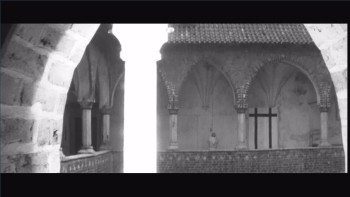 | 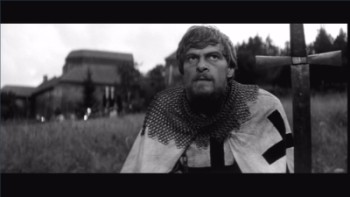 |
VlaÄil's eye for the period and focus on fundamentalist imagery don't stop The Valley of the Bees from being a premeditated and demanding narrative, told with light story exposition and heavy existential contemplation. As a work of art, while just absorbing the aesthetics, it's satisfying on its own accord; however, they're dressings for an accurate and profound portrait of a man enduring a clash of faith predicated on his desire to return to his homeland -- and the rift his "human" whims causes with the Teutonic Order. Allegories are drawn between training the knights and orchestrating a pack of hungry dogs to hunt down their pray, tying in to the somewhat empty lack of reward generated by obeying the volatile orders of a higher master. In that, you'll also see a few surgically handled yet hard-to-watch images that VlaÄil constructs, such as dogs hunting down a deer. This ties back towards the vicious punishment that the Masonic order exacted on another man who desired to stray from their confines, torn to shreds by dogs in a pit following a conviction from cloaked, stern members of his order.
The Valley of the Bees engrossingly batches all this together amid its hour-and-a-half pace with its audience, proving that VlaÄil's talent with existential thought and integrity breathes with the same essence as his influences. His performers are universally spectacular, natural but carrying a dramatic disposition in their eyes and facial mannerisms, all of which showcase emotional and mental turmoil that stretch beyond what they're allowing to the surface. That's the key with this style of picture, much like Max Von Sydow's recurring temperament in Ingmar Bergman's pictures. VlaÄil concentrates deeply on making his experience genuine and entrancing for the eyes, yet it's all for the purpose of enveloping us in a realistic portrait of history so we might identify with Ondrej's fraught mindset. We're enveloped so that we might wrap our minds around a man's desperate yearning to separate from the blade-wielding service for a higher power, a duty that calls for the loyal to have nothing more, and simply return to his home. His journey, both the physical actions and the internal turmoil, fascinates.
The DVD:
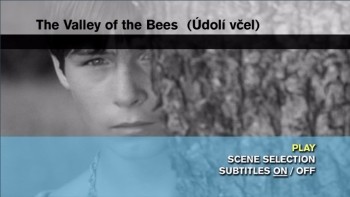 | 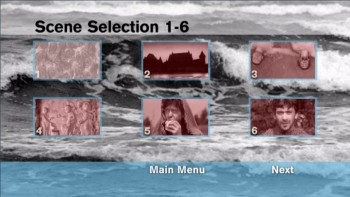 |
Second Run have offered The Valley of the Bees in a standard, clear-cased presentation with the company's signature minimalist artwork. Inside, a Booklet contains production credits for this home video presentation, and a lengthy information piece on Frantisek Vlacil composed by Peter Hames. Please note that this DVD is region-free but encoded in the PAL format, so makes certain that your television and/or DVD player are capable of displaying this content before purchasing.
Video and Audio:
Stunning is the film, and stunning is Second Run's presentation of The Valley of the Bees.
They have clearly taken this presentation with great care, as the 2.35:1 anamorphic widescreen presentation of late-'60s Czech film elements offers an excellently balanced, detailed, and properly contrast rendering of the black and white cinematography. Many alluring images appear that give this disc some real eye candy, such as religious buildings with gut-swelling arches within its architecture and quaint keeps, houses, and patches of both marsh and dry lands that offer succulent details within every shot. It's worth noting that some aliasing does crop up along a few edges, while some moire shimmering can be spotted in rooftops and against the chainmail armor worn by the knights. However, this print is astounding pristine, with highly convincing contrast levels -- including properly dark blacks and surprisingly dimensional gray levels -- that make Second Run's disc truly impressive and rarely indicative of the film's age.
A restored Mono track accompanies the visual transfer, and it's equally as impressive. Verbal clarity remains clear and distortion/pop free, while the engrossing free-form scoring, which includes flute notes that stretch the spectrum of pitches, create a balanced and uneasy atmosphere that's easy to get lost in. Monk chanting also fills the speakers throughout, which rings true, while other light sound effects like a deer's cry, burning embers, and other ambient notes further the atmosphere eloquently. English subtitles, which remained on-beat with the dialogue, arrive in clean and easy-to-read text that, unless I'm mistaken, never trails below the actual print of the film.
Special Features:
Aside from the textual information in the Booklet, no supplements are available here aside from a Scene Selection.
Final Thoughts:
Frantisek Vlacil's The Valley of the Bees (Udoli vÄel) requires a cinematic investment that many might not be as willing to invest in as others, as it asks its audience to grasp a historical critique on a 13th Century Teutonic Knight through a deliberately streamlined narrative. Counterbalanced by gorgeous photography and terse, evocative performances from all involved, it revolves around a stirring look at one man's desire to separate from an unwilling enlistment to weapon-wielding religious service -- and how it affects both his mentor and the order with whom he serves. VlaÄil's experience might be complex, but it's beautiful and enveloping all the same. Second Run's standard-definition presentation preserves the essence of the picture with impeccable quality, offering a Czech film from 1968 in a crisp presentation that rivals most offerings of contemporary films. Highly Recommended.
|
| Popular Reviews |
| Sponsored Links |
|
|
| Sponsored Links |
|
|
| Release List | Reviews | Shop | Newsletter | Forum | DVD Giveaways | Blu-Ray | Advertise |
|
Copyright 2024 DVDTalk.com All Rights Reserved. Legal Info, Privacy Policy, Terms of Use,
Manage Preferences,
Your Privacy Choices | |||||||









